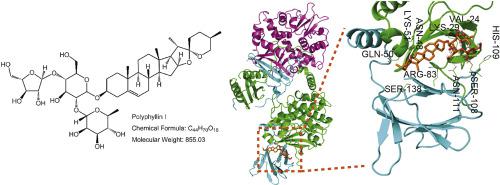当前位置:
X-MOL 学术
›
Arch. Biochem. Biophys.
›
论文详情
Our official English website, www.x-mol.net, welcomes your
feedback! (Note: you will need to create a separate account there.)
Polyphyllin I activates AMPK to suppress the growth of non-small-cell lung cancer via induction of autophagy.
Archives of Biochemistry and Biophysics ( IF 3.8 ) Pub Date : 2020-02-16 , DOI: 10.1016/j.abb.2020.108285 Yezi Wu 1 , Yuan Si 2 , Yuchen Xiang 1 , Tong Zhou 1 , Xuewen Liu 3 , Mingwei Wu 1 , Wenjuan Li 4 , Te Zhang 5 , Ke Xiang 6 , Liang Zhang 1 , Huzi Zhao 1 , Ying Liu 4
Archives of Biochemistry and Biophysics ( IF 3.8 ) Pub Date : 2020-02-16 , DOI: 10.1016/j.abb.2020.108285 Yezi Wu 1 , Yuan Si 2 , Yuchen Xiang 1 , Tong Zhou 1 , Xuewen Liu 3 , Mingwei Wu 1 , Wenjuan Li 4 , Te Zhang 5 , Ke Xiang 6 , Liang Zhang 1 , Huzi Zhao 1 , Ying Liu 4
Affiliation

|
Polyphyllin I (PPI), a bioactive constituent extracted from the rhizomes of Paris polyphylla, is cytotoxic to several cancer types. This study was designed to explore whether PPI prevents non-small-cell lung cancer (NSCLC) growth and to investigate the molecular mechanism. AMP-activated protein kinase (AMPK) has been implicated in the activation of autophagy in distinct tissues. In cultured human NSCLC cell lines, PPI induces autophagy by activating AMPK and then inhibiting mTOR signaling in a concentration-dependent manner. Furthermore, the activation of autophagy induced by PPI was reversed by the AMPK inhibitor compound C. Computational docking showed that PPI directly interacted with the allosteric drug and metabolite site of AMPK to stabilize its activation. Microscale thermophoresis and Drug Affinity Responsive Targeting Stability (DARTS) assay further confirmed the high affinity between PPI and AMPK. In vivo studies indicated that PPI suppressed the growth of NSCLC and increased the levels of LC3-II and phosphorylated AMPK in tumors isolated from a xenograft model of NSCLC in mice. Moreover, PPI exhibited favorable pharmacokinetics in rats. In summary, PPI conclusively acts as a direct AMPK activator to induce cell autophagy which inhibits the growth of NSCLC cells. In the future, PPI therapy should be applied to treat patients with NSCLC.
中文翻译:

Polyphyllin I通过诱导自噬激活AMPK抑制非小细胞肺癌的生长。
茶树素I(PPI)是从巴黎茶树的根茎中提取的一种生物活性成分,对多种癌症具有细胞毒性。这项研究旨在探讨PPI是否能阻止非小细胞肺癌(NSCLC)的生长并研究其分子机制。AMP激活的蛋白激酶(AMPK)与不同组织中自噬的激活有关。在培养的人NSCLC细胞系中,PPI通过激活AMPK,然后以浓度依赖的方式抑制mTOR信号传导来诱导自噬。此外,AMPK抑制剂化合物C逆转了PPI诱导的自噬激活。计算对接显示PPI直接与AMPK的变构药物和代谢位点相互作用,以稳定其激活。微型热泳和药物亲和响应靶向稳定性(DARTS)分析进一步证实了PPI和AMPK之间的高亲和力。体内研究表明,从小鼠NSCLC异种移植模型中分离出的肿瘤中,PPI抑制了NSCLC的生长并提高了LC3-II和磷酸化AMPK的水平。此外,PPI在大鼠中表现出良好的药代动力学。总之,PPI最终起着直接AMPK激活剂的作用,诱导细胞自噬,从而抑制NSCLC细胞的生长。将来,应将PPI疗法用于治疗NSCLC患者。PPI在大鼠中表现出良好的药代动力学。总之,PPI最终起着直接AMPK激活剂的作用,诱导细胞自噬,从而抑制NSCLC细胞的生长。将来,应将PPI疗法用于治疗NSCLC患者。PPI在大鼠中表现出良好的药代动力学。总之,PPI最终起着直接AMPK激活剂的作用,诱导细胞自噬,从而抑制NSCLC细胞的生长。将来,应将PPI疗法用于治疗NSCLC患者。
更新日期:2020-02-16
中文翻译:

Polyphyllin I通过诱导自噬激活AMPK抑制非小细胞肺癌的生长。
茶树素I(PPI)是从巴黎茶树的根茎中提取的一种生物活性成分,对多种癌症具有细胞毒性。这项研究旨在探讨PPI是否能阻止非小细胞肺癌(NSCLC)的生长并研究其分子机制。AMP激活的蛋白激酶(AMPK)与不同组织中自噬的激活有关。在培养的人NSCLC细胞系中,PPI通过激活AMPK,然后以浓度依赖的方式抑制mTOR信号传导来诱导自噬。此外,AMPK抑制剂化合物C逆转了PPI诱导的自噬激活。计算对接显示PPI直接与AMPK的变构药物和代谢位点相互作用,以稳定其激活。微型热泳和药物亲和响应靶向稳定性(DARTS)分析进一步证实了PPI和AMPK之间的高亲和力。体内研究表明,从小鼠NSCLC异种移植模型中分离出的肿瘤中,PPI抑制了NSCLC的生长并提高了LC3-II和磷酸化AMPK的水平。此外,PPI在大鼠中表现出良好的药代动力学。总之,PPI最终起着直接AMPK激活剂的作用,诱导细胞自噬,从而抑制NSCLC细胞的生长。将来,应将PPI疗法用于治疗NSCLC患者。PPI在大鼠中表现出良好的药代动力学。总之,PPI最终起着直接AMPK激活剂的作用,诱导细胞自噬,从而抑制NSCLC细胞的生长。将来,应将PPI疗法用于治疗NSCLC患者。PPI在大鼠中表现出良好的药代动力学。总之,PPI最终起着直接AMPK激活剂的作用,诱导细胞自噬,从而抑制NSCLC细胞的生长。将来,应将PPI疗法用于治疗NSCLC患者。









































 京公网安备 11010802027423号
京公网安备 11010802027423号